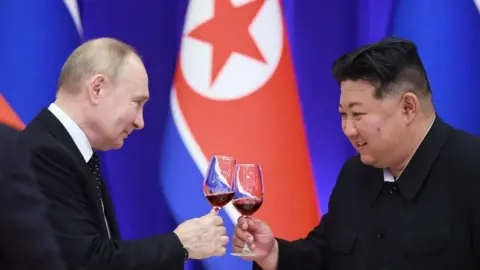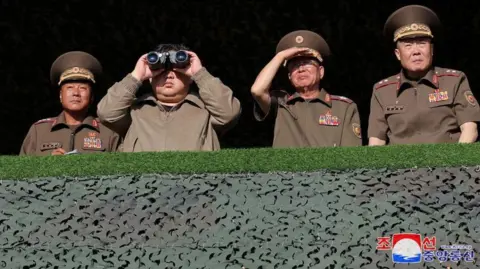Are North Korean troops joining Russia’s war in Ukraine?
Russia’s army is forming a unit of some 3,000 North Koreans, a Ukrainian military intelligence source has told the BBC, in the latest report suggesting that Pyongyang is forming a close military alliance with the Kremlin.
So far the BBC has yet to see any sign of such a large unit being formed in Russia’s Far East, and Kremlin spokesman Dmitry Peskov has dismissed reports of North Korean involvement.
“This is not only British intelligence, it is also American intelligence. They report it all the time, they don’t provide any evidence,” he said.
There is no doubt Moscow and Pyongyang have deepened their levels of cooperation in recent months. North Korean leader Kim Jong Un sent Vladimir Putin a birthday message only last week calling him his “closest comrade”.
Ukraine’s Volodymyr Zelensky has spoken of North Korea joining the war, and South Korea’s defence minister said this month that the chance of a North Korean deployment in Ukraine was “highly likely”.
The biggest question mark is over the numbers involved.
A military source in Russia’s Far East confirmed to BBC Russian that “a number of North Koreans have arrived” and were stationed in one of the military bases near Ussuriysk, to the north of Vladivostok. But the source refused to give a precise number, other than that they were “absolutely nowhere near 3,000”.
Military experts have told us they doubt Russian army units can successfully incorporate North Korean soldiers in their thousands.
“It wasn’t even that easy to include hundreds of Russian prisoners at first – and all those guys spoke Russian,” one analyst – who is in Russia so didn’t want to be named – told the BBC.
Even if they did number 3,000, it would not be big in a battlefield sense, but the US is as concerned as Ukraine.
“It would mark a significant increase in their relationship,” said US state department spokesman Matthew Miller, who saw it as “a new level of desperation by Russia” amid battlefield losses.
 VLADIMIR SMIRNOV/POOL/AFP
VLADIMIR SMIRNOV/POOL/AFPIt was back in June that Vladimir Putin toasted a “peaceful and defensive” pact with Kim Jong Un.
And there is mounting evidence that North Korea is supplying Russia with ammunition, as recently demonstrated by the recovery of a missile in Ukraine’s Poltava region.
In fact, reports of mines and shells supplied by Pyongyang date back to December 2023 in Telegram chats involving Russia’s military communities.
Russian soldiers, stationed in Ukraine, have often complained about the standard of ammunition and that dozens of soldiers have been wounded.
Kyiv suspects that a unit of North Korean soldiers is preparing in the Ulan-Ude region close to the Mongolian border ahead of deployment to Russia’s Kursk province, where Ukrainian forces launched an incursion back in August.
“They could guard some sections of the Russian-Ukrainian border, which would free Russian units for fighting elsewhere,” said Valeriy Ryabykh, editor of the Ukrainian publication Defence Express.
“I would rule out the possibility that these units will immediately appear on the front line.”
Ryabakh is not alone in this thought.
 KCNA/Reuters
KCNA/ReutersNorth Korea may have some 1.28 million active soldiers but its army has no recent experience of combat operations, unlike Russia’s military.
Pyongyang has pursued the old Soviet model in its armed forces but it is unclear how its main force of motorised infantry units might fit into the war in Ukraine.
Then there is the obvious language barrier and an unfamiliarity with Russian systems that would complicate any fighting roles.
That does not preclude North Korea’s military taking part in Russia’s full-scale war in Ukraine, but they are most recognised by experts for their engineering and construction abilities, not for fighting.
What they do both have are shared incentives.
Pyongyang needs money and technology, Moscow needs soldiers and ammunition.
“Pyongyang would be paid well and maybe get access to Russian military technology, which otherwise Moscow would have been reluctant to transfer to North Korea,” says Andrei Lankov, director of the Korea Risk Group.
“It would also give their soldiers real combat experience, but there is also the risk of exposing North Koreans to life in the West, which is a considerably more prosperous place.”
For Putin, there is an urgent need to make up for significant losses during more than two and half years of war.
Valeriy Akimenko from the UK’s Conflict Studies Research Centre believes deploying North Koreans would help the Russian leader deal with the previous round of mandatory mobilisation not going well.
“So he thinks, as the Russian ranks are thinned out by Ukraine, what a brilliant idea – why not let North Koreans do some of the fighting?”
President Zelensky is clearly concerned about how this hostile alliance could evolve.
There have not been Western boots on the ground in Ukraine for fear of escalation.
However, if reports of hundreds of North Koreans preparing for deployment are borne out, the idea of foreign boots on the ground in this war would appear to be less of a concern for Vladimir Putin.



